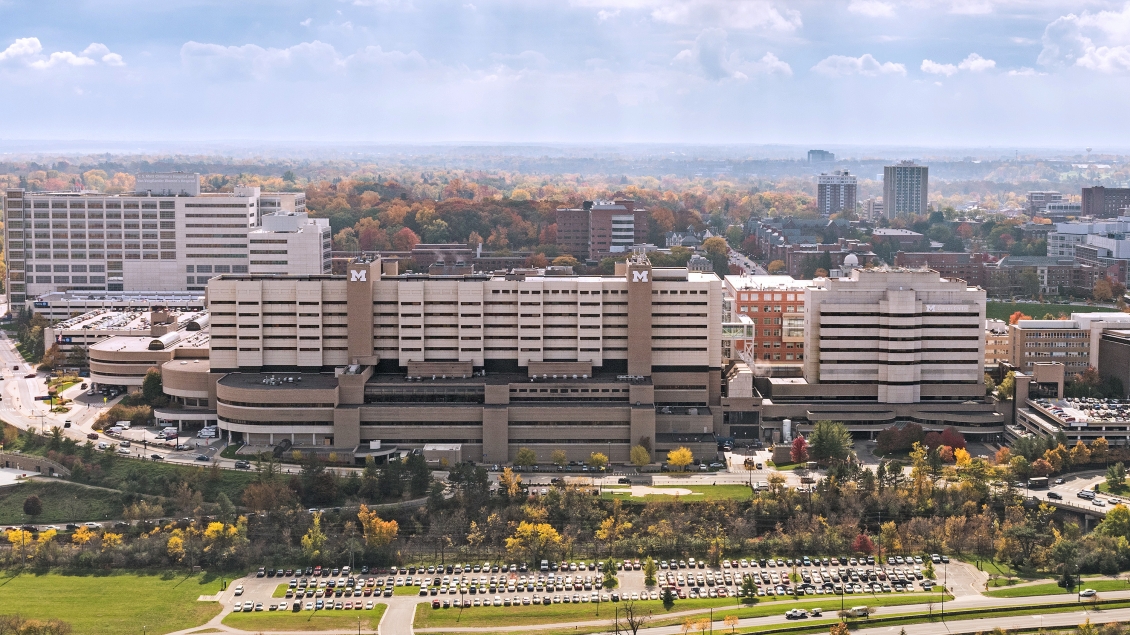
The three-year categorical program emphasizes comprehensive training in the U-M Medical School Internal Medicine for individuals destined for careers in either academic or community-based General Internal Medicine, and for individuals who will go on to seek subspecialty fellowship training. Each year U-M Medical School recruits a talented and diverse group of 44 trainees into the categorical program.
The training is balanced between inpatient and ambulatory experiences and is broad-based, providing exposure to generalists, hospitalists and a wide variety of subspecialists. All of the training occurs in an academic environment, under the supervision of Michigan Medicine faculty members, and exposes the learners to cutting-edge technology and to world-class research.
| THREE YEAR OVERVIEW | |||
|---|---|---|---|
| Rotation | HO 1 | HO 2 | HO 3 |
| Inpatient Wards & ICU | 6-7 months | 4-5 months | 4-5 months |
| Inpatient Electives | 2-2.5 months | 2-2.5 months | 2-2.5 months |
| Ambulatory & Outpatient Blocks | 2.5-3 months | 3-3.5 months | 3-3.5 months |
| Night Team | 1-1.5 months | 1-1.5 months | 1-1.5 months |
| Research | None | 2-4 weeks | 2-4 weeks |
| Vacation | 4 weeks | 4 weeks | 4 weeks |
House Officer I
The first year (internship) of the categorical program is designed to provide a broad experience in Internal Medicine. Each intern could expect 7 - 7.5 months of inpatient experience with 1 month night service, during which time they are considered the primary physician for the ward service. We prioritize making interns the primary order writers, and on giving them the first opportunity for procedures. Throughout the year, each intern maintains a weekly continuity clinic (rescheduled during inpatient months to minimize conflicts while ensuring continuity of care).
- One to two months on the General Medicine services at the University Hospital
- One to two months on the General Medicine services at the VA Hospital
- One to two months on the Subspecialty services at the University Hospital
- One to two months on the Cardiology services at the University Hospital
- Two to four weeks on the Intensive Care Unit service at the University Hospital
- Around two months of Subspecialty Electives/Consults
- Two to three months of ambulatory clinics and outpatient electives
- Four to six weeks of night service on ICU or Subspecialty services
- Four weeks of Vacation (taken as two 2-week blocks)
House Officer II
As a second-year resident in the program, the house officer develops an expanding role as a consultant and also as a supervisor on most of the inpatient ward services. While on the General Internal Medicine service, the senior resident is responsible for the overall direction and operation of the team. Second-year house officers will also serve as supervising residents on the subspecialty services, the cardiology services and the critical care service. While assigned to these rotations, the resident will have the opportunity to evaluate and manage interesting cases, and they will maintain close daily contact with the rounding staff physician from that particular discipline. The greatest proportion of the second year, however, is spent in a combination of subspecialty elective rotations and ambulatory block rotations. During all of these experiences, the resident will continue to manage a panel of continuity patients
- Four to five inpatient ward rotations (a combination of either subspecialty services at the University Hospital, General Medicine services at the VA and University Hospital, the Cardiology service, and/or the Critical Care services)
- Four to six weeks of night service on ICU or Subspecialty services
- Two to three months on subspecialty elective or consult rotations
- Two to three months of ambulatory clinics and outpatient electives
- Four weeks of research
- Two weeks in the Emergency Department and/or Geriatrics
- Four weeks of Vacation (taken as two 2-week blocks)
House Officer III
Much like the second-year schedule, the third year is tailored to the individual interest of the resident, with continued opportunities to serve as a consultant, supervisor of ward rotations, and an expanded role as teacher. In addition, there is increased flexibility to accommodate requests for protected time to conduct research or pursue off-site electives. The continuity clinic is maintained one-half day each week.
- Four to five inpatient ward rotations (a combination of either subspecialty services at the University Hospital, General Medicine services at the University Hospital or the VA, the Cardiology service, and/or the Critical Care services)
- Four to six weeks of night service on ICU or Subspecialty services
- Two to three months on subspecialty elective or consult rotations
- Two to three months of ambulatory clinics and outpatient electives
- Four weeks of research
- Two weeks in the Emergency Department and/or Geriatrics
- Four weeks of Vacation (taken as two 2-week blocks)